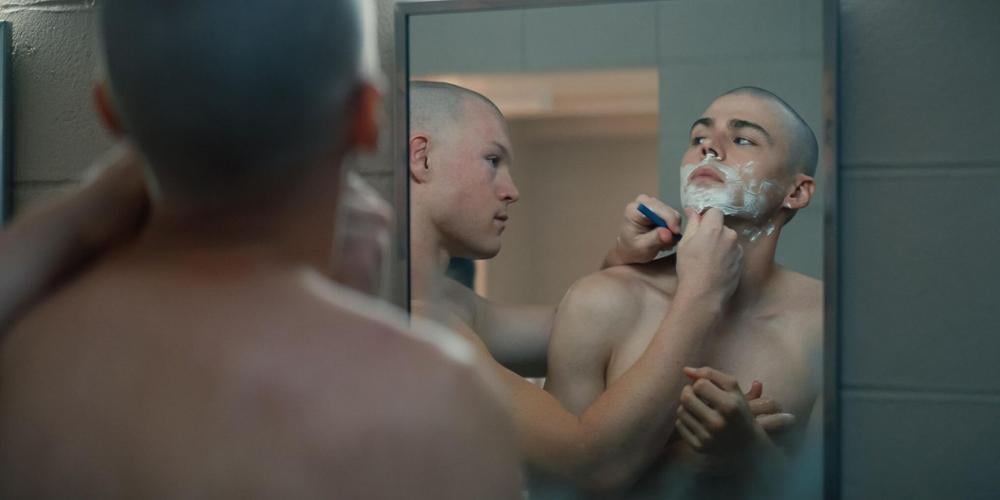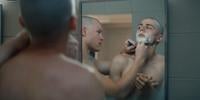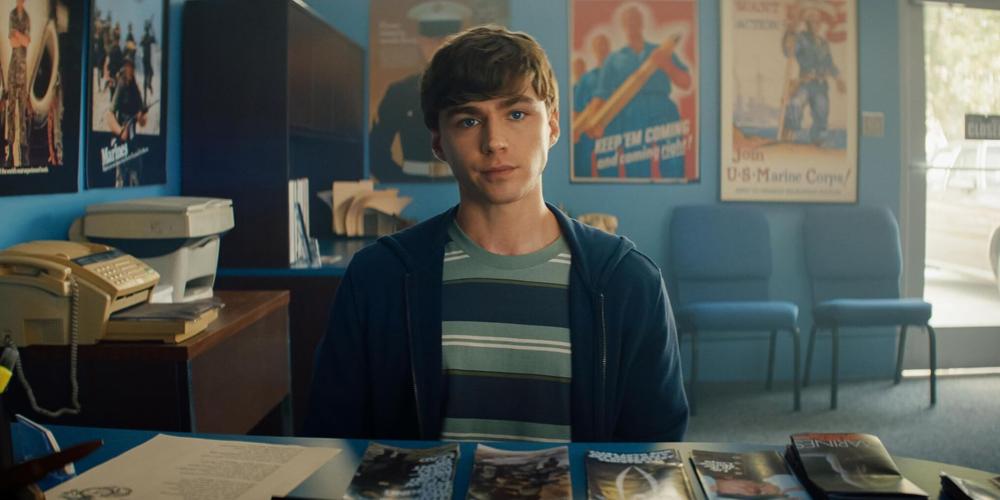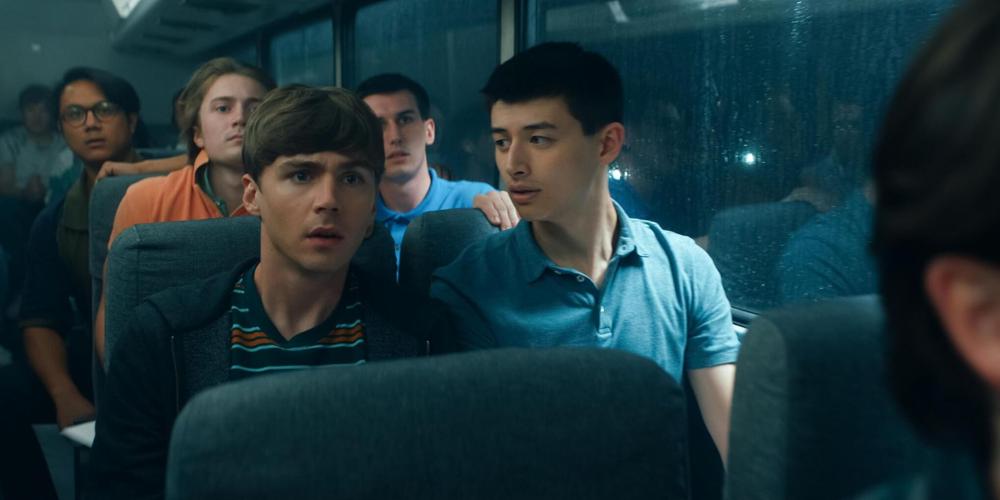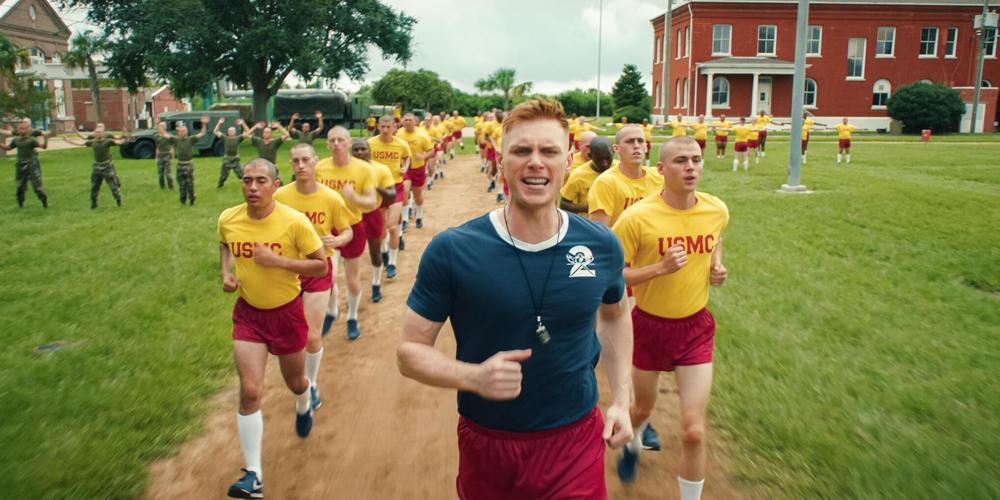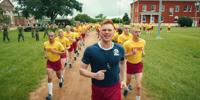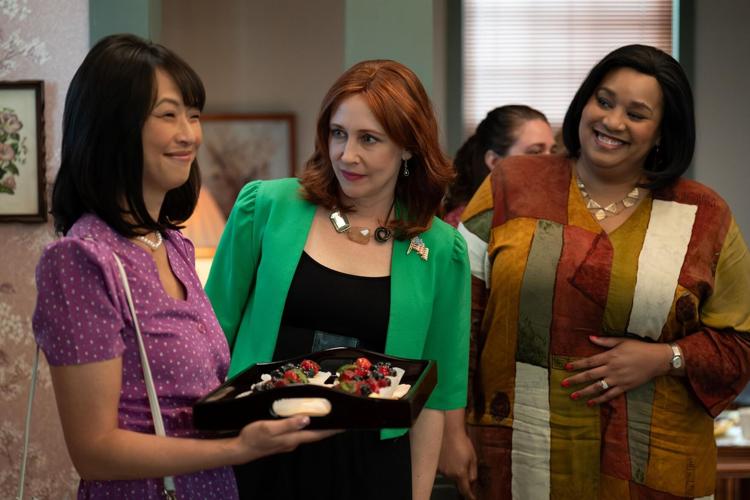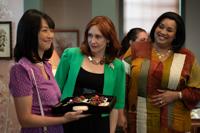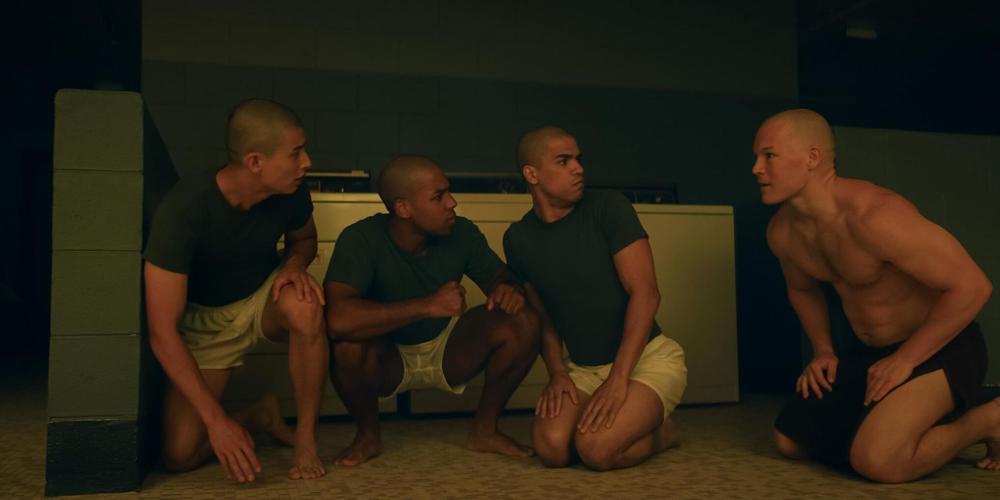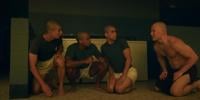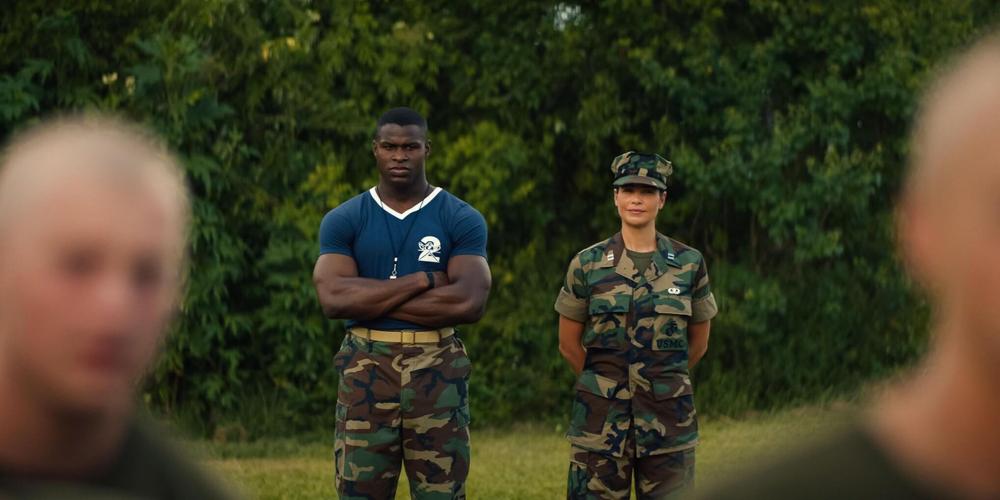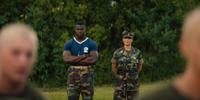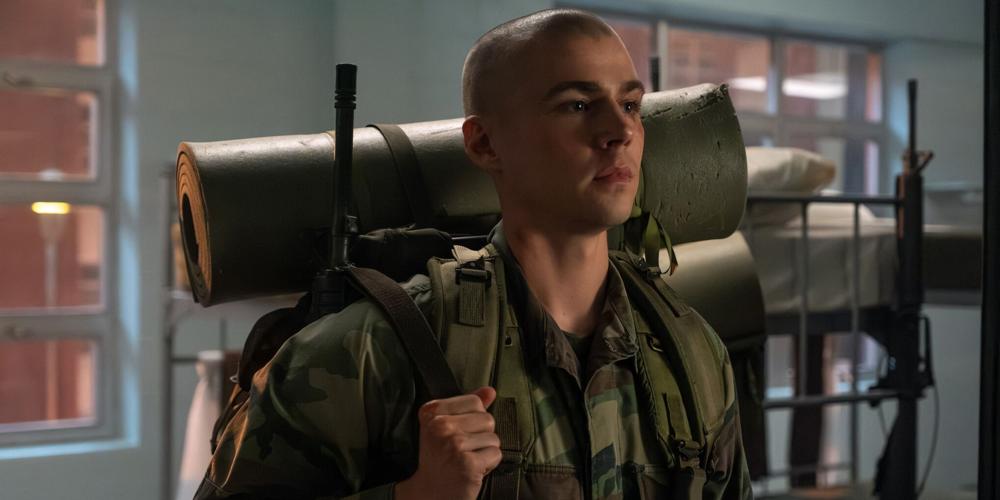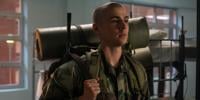After President Bill Clinton took office in 1993, our 42nd U.S. President, he instituted a policy at the Department of Defense called "Don't Ask, Don't Tell" or DADT. It was an act that prohibited military personnel from discriminating against or harassing closeted homosexual or bisexual service members or applicants. Yet, it still barred openly gay or openly LGBTQ people from any branch of the military. It was a flawed system, but it did provide some protection. This series, created by Andy Parker (Pantheon and Tales of the City), and based on a memoir by Greg Cope White, takes place before DADT. This series takes place under President George H. W. Bush, our 41st U.S. President. More specifically, the series takes place in 1990 right before the Gulf War, so the series is about the time before DADT when the military was actively discriminating against gay people and harassment was still very much a problem.
There haven't been that many film or television shows that focus on this issue of DADT or the discrimination of gay people in the military, at least not from American productions. One early example in the United States was Showtime's Soldier's Girl (2003), which was about a real-life soldier in the U.S. Army who was killed in the 90's by a fellow soldier simply for being a part of the LGBTQ community. Ten years ago, there was D.M.W. Greer's Burning Blue (2014), which was about a gay witch hunt in the military, based on Greer's experiences as a naval pilot. More recently, there was Elegance Bratton's The Inspection (2022), which was based on Bratton's experiences as a marine, going through boot camp. In my review for that 2022 film, I compared Bratton's feature to Stanley Kubrick's Full Metal Jacket (1987) and Joel Schumacher's Tigerland (2000). Kubrick's film is set in the same place as Bratton's film and the same place as this series, Parris Island, South Carolina. Schumacher's film isn't about gay soldiers but Schumacher was himself openly gay and applied that lens to a lot of his work. Because of which, this series is essentially Bratton's film stretched over eight episodes with a little bit of Schumacher's gaze but instead of centering on an African American who is more motivated by economic reasons, the protagonist here is motivated by more sociological ones.

Miles Heizer (13 Reasons Why and Parenthood) stars as Cameron Cope, a 17-year-old boy from Louisiana. He lives with his single mother and younger brother. He seems to have a fairly normal, suburban life, not totally impoverished, possibly lower, middle-class. He says he can't afford college, but neither can anyone, which is why people apply for scholarships, grants or loans. We're not shown Cameron trying for any of those. A lot of graduates know what they want to do. They want to be a lawyer, a doctor or a businessman, or some profession that they've chosen. Even if he did apply for grants or loans, Cameron doesn't seem to know what he wants to be or what to do with his life. He's adrift or lost. It doesn't help that he's secretly gay. Economics don't seem to be the driving factor here. What leads him to join the military is the fact that he's bullied. Fellow students at school bully him. His mother and brother bully him in more insidious ways, basically picking on him to "man" up or be more masculine. He's graduating from high school and he doesn't have any direction except he doesn't want to come off as gay or as "weak."
Liam Oh, in his first TV series, co-stars as Ray McAffey, the Asian American, best friend of Cameron. Ray is the only one who knows that Cameron is gay. They presumably went to school together, but, in the scenes in which Cameron is bullied, we don't ever see where Ray is or if he's been any help much in his friend getting picked on. We only learn that after graduation, Ray is planning on joining the marines and following in his father's footsteps. Cameron learns he can join and basically accompany Ray. At first, he thinks boot camp will be like summer camp, but Cameron also seems as if that the marines represent a version of masculinity that is probably the best or ultimate version. Therefore, Cameron signs up and is shipped with Ray to the Marine Corps Recruit Depot on Parris Island, North Carolina.

What follows are eight episodes of watching Cameron and Ray go through boot camp. It's the typical stuff we've seen where drill sergeants yell at the recruits, verbally abusing them, screaming insults and barking orders. There's also a series of physical challenges, obstacle courses and training sessions that are grueling and tough. As I watched, I wondered what the point was. In films like Full Metal Jacket or Tigerland, the point is to critique the military and critique ultimately the American presence in the Vietnam War. In films like Burning Blue and The Inspection, the point is to critique homophobia. I'm not sure what the point here is. Ostensibly, this show is also about homophobia and yes, that's an aspect, but I wouldn't say it's as prominent or central as it could have been.
Max Parker (Vampire Academy and Emmerdale) also co-stars as Liam Robert Sullivan, a drill sergeant who is new to Parris Island. He was serving in Guam six months prior, but he gets transferred here. When it comes to the homophobia in the military in the time before DADT, Sullivan's story line is what hones that theme. Sullivan is gay. While he was in Guam, he was having a secret affair with a man named Aaron Wilkinson, played by Sachin Bhatt (The Company You Keep and Queer As Folk). Wilkinson is a closeted army major who gets outed and investigated by NCIS. From Episode 5 to the end, Sullivan has to deal with the repercussions of that investigation. Basically, he tries to act like the uber-masculine, tough guy. Unfortunately, the series doesn't reckon with those repercussions or delve into them, as much as I would have liked.

For example, the other drill sergeants learn that Sullivan is under investigation by NCIS and we never get their reactions or thoughts. We don't even get their feelings on the issue. Cedrick Cooper (Will Trent and Naomi) plays Marcus McKinnon and Nicholas Logan (Dark Winds and Hap and Leonard) plays Cary Wayne Howitt. Both McKinnon and Howitt are the other drill sergeants. They work with Sullivan to whip the recruits into shape and turn them into trained killers. When their platoon gets into trouble, in part due to that NCIS investigation and Sullivan not being available, it would make them want to know what's going on with Sullivan more. I was more curious to see the series grapple with that potential conflict between the drill sergeants, but instead the show drops it.
Vera Farmiga (Bates Motel and The Conjuring) also co-stars as Barbara Cope, the mother to Cameron. Farmiga is an incredible actress and the show occasionally returns to her throughout the various episodes. She's a notable actress and arguably the most high-profile and biggest celebrity in the cast. Much like Gabrielle Union in The Inspection, there isn't much for her to do in regards to the main plot. Farmiga's Barbara could have been a conduit for talking about gay discrimination in general or in the military. Barbara meets Setsuko McAffey, played by Joy Osmanski. Setuko is the mother to Ray. So, Cameron's mother is friends with the mother to Cameron's best friend. There is a conversation that could have been had between Barbara and Setsuko about the meaning of Cameron being a gay soldier, because Barbara knows. Yet, the series doesn't go there either.

It's almost as if the show forgot that the main character is a gay soldier. The show spends an inordinate amount of time with the heterosexual soldiers. Those other recruits basically steal focus, and the series simply becomes these recruits trying to be the best soldier and thus the best marine. It's great that a queer actor, Angus O'Brien, plays Hicks, one of the heterosexual soldiers. That's cool. Yet, the show gets mired in so many of those straight guys and their issues. There are two literal and biological brothers who are in the same platoon as Cameron. There's two Latinos who are in the same platoon, which something that would likely happen, so the show is well represented. The series juggles all of them and their issues to a significant degree. The series also juggles Ray having a bit of a romance with a female recruit from another platoon, which wouldn't have been a bother, if the show gave Cameron an actual romance too .
Watching a bunch of straight guys in boot camp or even watching straight guys serving in the military is not difficult to find in mainstream media. SEAL Team (2017) on CBS, Generation Kill (2008) on HBO and Band of Brothers (2001) on HBO are recent examples. There was even a film this year, Warfare (2025), which focused on a straight male platoon. All of those examples are about soldiers in actual combat situations. This series is about preparing for such situations, so in that this series stands out. It's about how these recruits need to be prepared, which if you put aside that the center of this story is a gay soldier, then the show can be forgiven.

However, the focus is mostly on the physical preparations for war. Arguably, there are other aspects that need to be prepared. Those other aspects involve psychological preparations. It's reiterated that it's about turning these boys into killing machines. There's one scene that critiques how the psychological aggressiveness might result in severe damage, particularly to one of the boys. It's brushed over. There's another scene, which nods to mental health. It's a scene where McKinnon asks anyone if they need to see the chaplain, not for spiritual guidance per se, but for mental counseling. Yet, that's brushed over and we never even meet the chaplain, which shows how little the series actually cares about mental health.
Jack Kay, in his series debut, plays Joshua Jones, a new recruit who isn't in Cameron's platoon in the beginning. He's introduced late in the series in either Episode 6 or 7. Immediately, we learn that Jones is secretly gay too. Yet, Jones is more confident and bolder than Cameron. He's not as afraid to be somewhat effeminate. He challenges the idea of masculinity that Sullivan projects and wants the recruits to mimic. There's a hint that like Ray, Cameron might have a romance with Jones. Yet, it doesn't happen. It's a shame that the main character who is gay can't experience any joy or happiness in this series with regard to that part of his life.

Rated TV-MA for language, nudity and smoking.
Running Time: 1 hr. / 8 eps.
Available on Netflix.

